The Samsung Galaxy A52 5G, released in March 2021, is part of the lower-priced A line of devices that provide alternatives to the brand’s more expensive flagships. The A52 has some features you would normally expect on a more expensive model, however, such as the FHD+ 6.5-inch Super AMOLED display, the Exynos Octa-core processor, and a fast-charging 4500 mAh battery.
Samsung has this to say about this model’s audio setup: “With two speakers — one on top and one at the bottom — you can get a stereo audio experience without earphones. Take movie night or your favorite games to the next level with cinematic sound that immerses you in the scene.”
We put the Samsung Galaxy A52 5G through our rigorous DXOMARK Audio test suite to measure its performance both at recording sound using its built-in microphones, and at playing audio back through its built-in speakers. In this review, we will break down how it fared in a variety of tests and several common use cases.
Audio specifications include:
- Two stereo speakers (bottom right, side-firing; top center, front-firing)
- 3.5mm jack for headphones
About DXOMARK Audio tests: For scoring and analysis in our smartphone audio reviews, DXOMARK engineers perform a variety of objective tests and undertake more than 20 hours of perceptual evaluation under controlled lab conditions. This article highlights the most important results of our testing. Note that we evaluate both Playback and Recording using only the device’s built-in hardware and default apps. (For more details about our Playback protocol, click here; for more details about our Recording protocol, click here.)
Test summary
Scoring
Sub-scores and attributes included in the calculations of the global score.
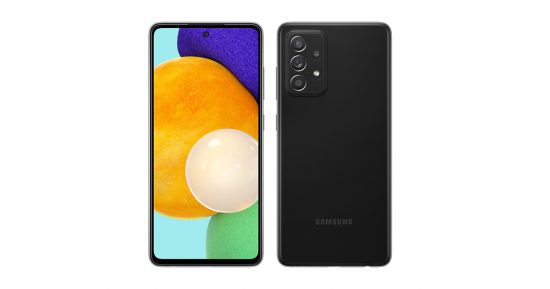
Samsung Galaxy A52 5G


 84th
84th 10th
10thPlayback
Pros
- Top of rankings for artifacts
- Generally good tonal balance
- Large wideness and precise localizability
Recording
Pros
- Good overall timbre score
- Good SNR performance in home and meeting use cases
- Correct recording loudness in memo app
Cons
- Low midrange overly prominent in all tested use cases
- Tonal balance is dark with a lack of clarity
- Strong compression impairs dynamics in high SPL scenario
With a global score of 69, the Samsung Galaxy A52 5G does pretty well for its price point of just under $400, which puts it in our High-end category of smartphones. It just about matches scores with the Apple iPhone SE from 2020 (which had a 70), and it actually scored better than some more expensive models in our audio ranking database.
In playback testing, the Samsung Galaxy A52 5G demonstrated good overall tonal balance, with a consistent and full midrange. The attack is sharp and precise. The stereo effect works well — wideness was quite large. Localizability was precise. The A52 had an excellent score for artifacts, with no temporal or spectral artifacts detectable.

The shortcomings of the A52 5G included a lack of bass and low-end extension, which was an impediment to the timbre performance, especially at soft and maximum volumes. In the gaming use case, the tonal balance was overly midrange focused. The minimum volume step is too low — it was hard to properly hear highly dynamic content like classical music.
As a recording device, the Samsung Galaxy A52 5G earned a good overall score for timbre, including capturing correct bass presence in our high sound pressure level (SPL) use-case scenario (an electronic music concert). The signal-to-noise ratio (SNR) was solid in the home and meeting use-case scenarios. Wideness was very good in life video (rear camera). The memo app did a nice job in capturing correct loudness levels.
The drawbacks include a prominence of low midrange in all the scenarios our engineers tested. The tonal balance tends toward a darkness and lack of clarity. In the high SPL use case, strong compression tamps down the the dynamics performance. The memo app records in in mono, not an ideal situation. Loudness is a bit low for recordings when using the life video app.
Sub-scores explained
The DXOMARK Audio overall score of 69 for the Samsung Galaxy A52 is derived from its Playback and Recording scores and their respective sub-scores. In this section, we’ll take a closer look at these audio quality sub-scores and explain what they mean for the user.
Playback

Timbre
Samsung Galaxy A52 5G
65
89
Timbre tests measure how well a phone reproduces sound across the audible tonal range and takes into account bass, midrange, treble, tonal balance, and volume dependency.
The Samsung Galaxy A52 5G was slightly above average in timbre, achieving a decent performance. This Samsung device delivered respectably on treble and remains precise in the upper register. The midrange is consistent and quite full, although our engineers noted a slight lack of low mid. In the games use case, the A52 5G is midrange-focused and lacks extension.
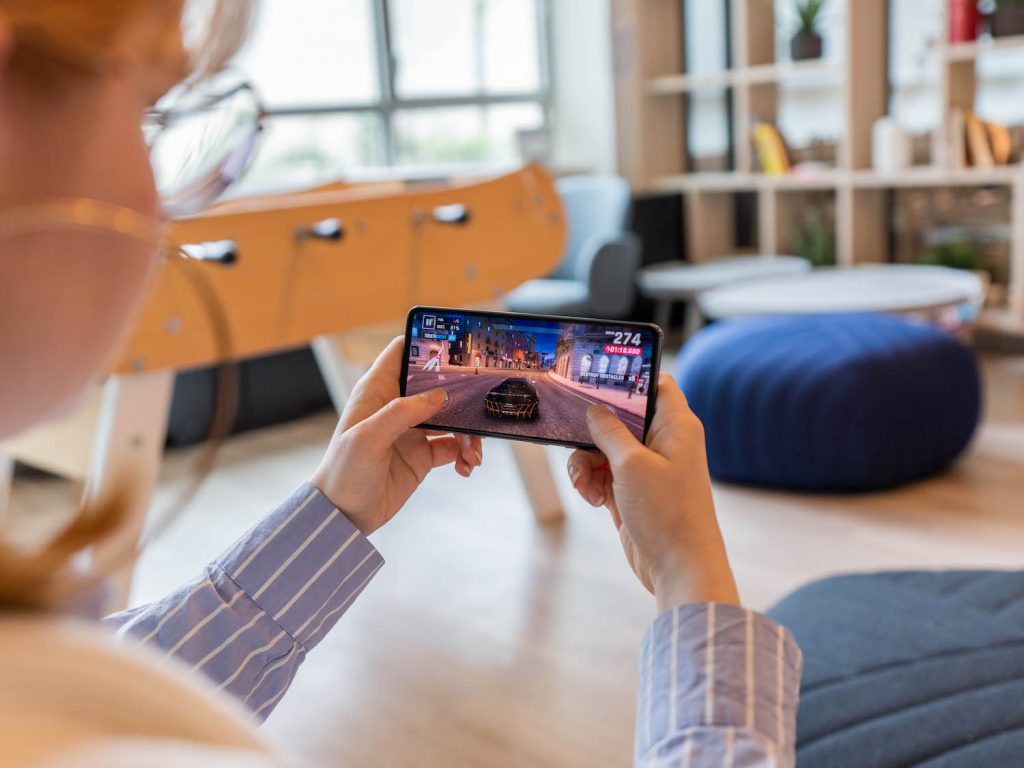
The lower register is the main weakness of the timbre performance. The A52 lacks bass and low-end extension. The lack of lower-register content becomes even more prominent at soft and maximum volumes, and in portrait mode.

Dynamics
Samsung Galaxy A52 5G
66
81
DXOMark’s dynamics tests measure how well a device reproduces the energy level of a sound source, and how precisely it reproduces bass frequencies.
The A52 turned in a good overall dynamics performance. Attack was sharp and precise, and bass precision was quite good, especially considering the lack of lower-end content. At soft volumes, that lack of low end did have a negative effect on bass precision.

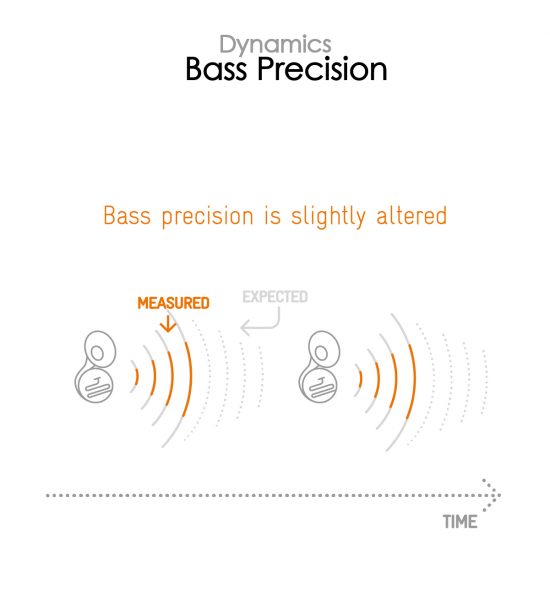
Sub-attributes for perceptual spatial tests include localizability, balance, distance, and wideness.
The Samsung Galaxy A52 5G did well in the spatial attribute. Localizability was good — sound sources could be pinpointed in the audio scene precisely, except when the smartphone was held in portrait mode where it becomes blurry, but this is a common situation.
Centered elements tend to be unbalanced, tilting toward the right, where the main speaker fires. As with most Samsung devices, the wideness was good, with a large audio scene. The device also performed well in presenting a realistic perceived distance of voices.

Volume
Samsung Galaxy A52 5G
62
91
Volume tests measure both the overall loudness a device is able to reproduce and how smoothly volume increases and decreases based on user input.
Volume was not a strong suit for the A52 5G. The maximum volume is adequate, but the minimum volume step is too low, making it difficult to hear highly dynamic content like classical music.
| Hip-Hop | Classical | |
| Samsung Galaxy A52 5G | 72 dBA | 68.3 dBA |
| Samsung Galaxy S21 Ultra 5G (Exynos) | 73.2 dBA | 71 dBA |
| Apple iPhone 12 mini | 74.2 dBA | 70.9 dBA |

Artifacts
Samsung Galaxy A52 5G
96
113
Artifacts tests measure how much source audio is distorted when played back through a device’s speakers. Distortion can occur both because of sound processing in the device and because of the quality of the speakers.
The Samsung Galaxy A52 5G had an outstanding score in artifacts — in fact, it leads the entire field, topping its brand sibling, the Samsung Galaxy S21 Ultra 5G (Exynos), and the Asus ROG Phone 5, both of which held the previous high score of 93 for this attribute. Our engineers did not detect any noticeable artifacts detected except for some slight distortion when testing using synthetic signals. One drawback, however, is that the A52’s speakers are easily occluded by hands when playing games.
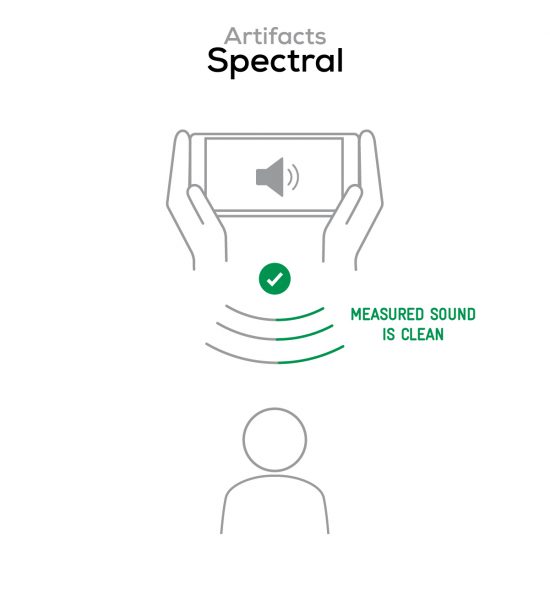
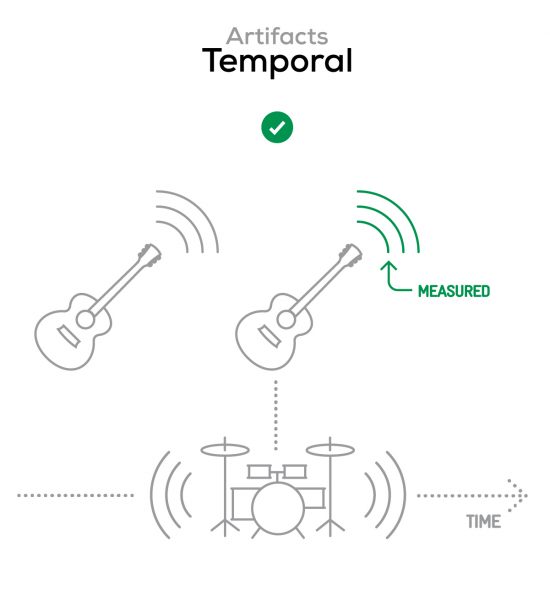
Recording

Timbre
Samsung Galaxy A52 5G
74
91
The Samsung Galaxy A52 earned a solid score in recording timbre, but there were some issues. The overall performance is impaired by a prominence of low midrange, which leads to a muffled sound in all the use cases tested. Overall, the tonal balance is dark, with a lack of clarity and treble, even if some top end is present.
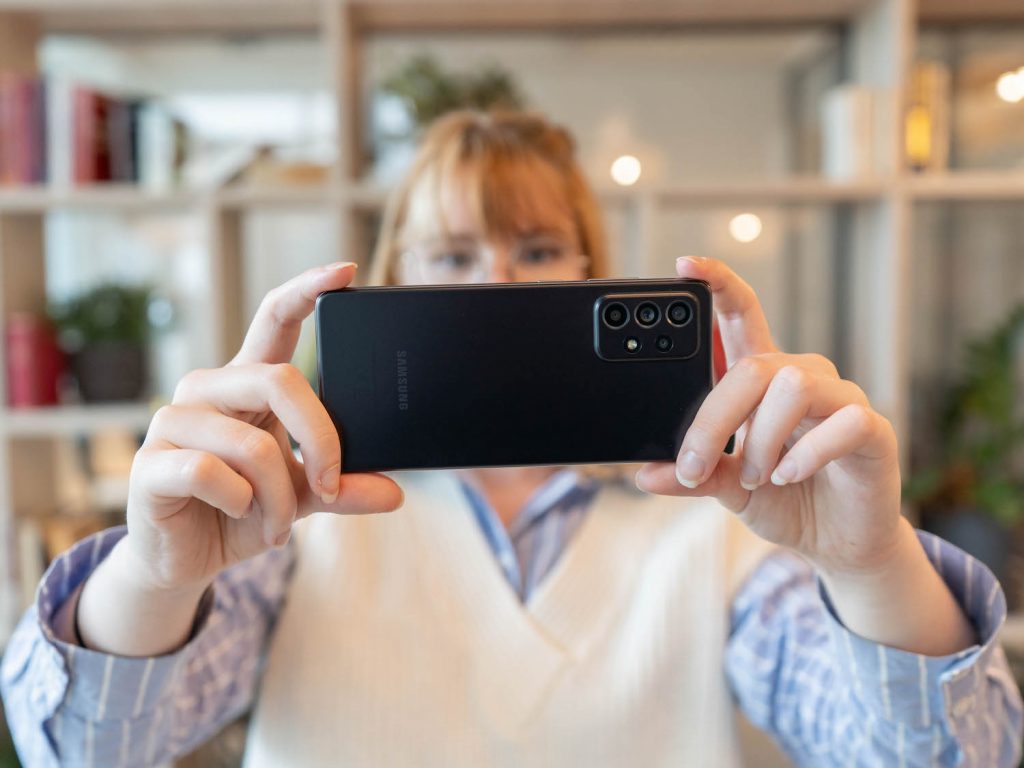
In the high SPL scenario, the same problems emerge — lack of treble and a tonal balance focused on the low midrange. Bass presence is decent, but it lacks low-end extension.

Dynamics
Samsung Galaxy A52 5G
68
81
The A52 earned an above average score in recording dynamics. In the urban recording scenario, background noise is not well reduced, and the low midrange prominence accentuates its presence. Signal-to-noise ratio (SNR) is better in the home and meeting use cases. The envelope is correctly represented, but plosives are not completely accurate because the attack is a bit blurry.
In the electronic music concert scenario, the dynamics performance was hindered by noticeable compression that produces a rounded attack, uneven sustain, and decay that is too loud. As a result, the rendering of the envelope is not accurate.

Spatial
Samsung Galaxy A52 5G
54
78
In the spatial attribute, the A52 was about average. The wideness produced in life video is very good, and localizability is correct, although it suffers when recording in an environment with a lot of background noise (the urban use-case scenario). There, sound source positions were disrupted by the background noise, and distance perception was also affected. The background noise tended to overwhelm voices.
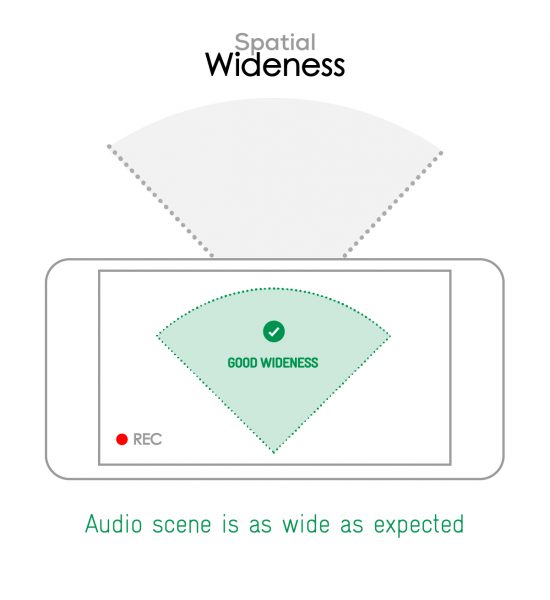
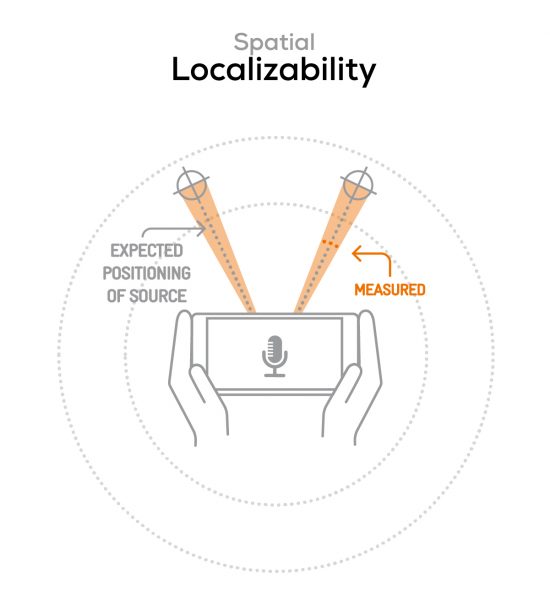
In the home use case scenario, distance performance is better but still hindered; voices seemed slightly too close because of the low midrange prominence. In selfie video, where the device is held in portrait mode, wideness becomes very limited. The audio scene is very narrow, which combined with a muffled tonal balance impairs localizability.
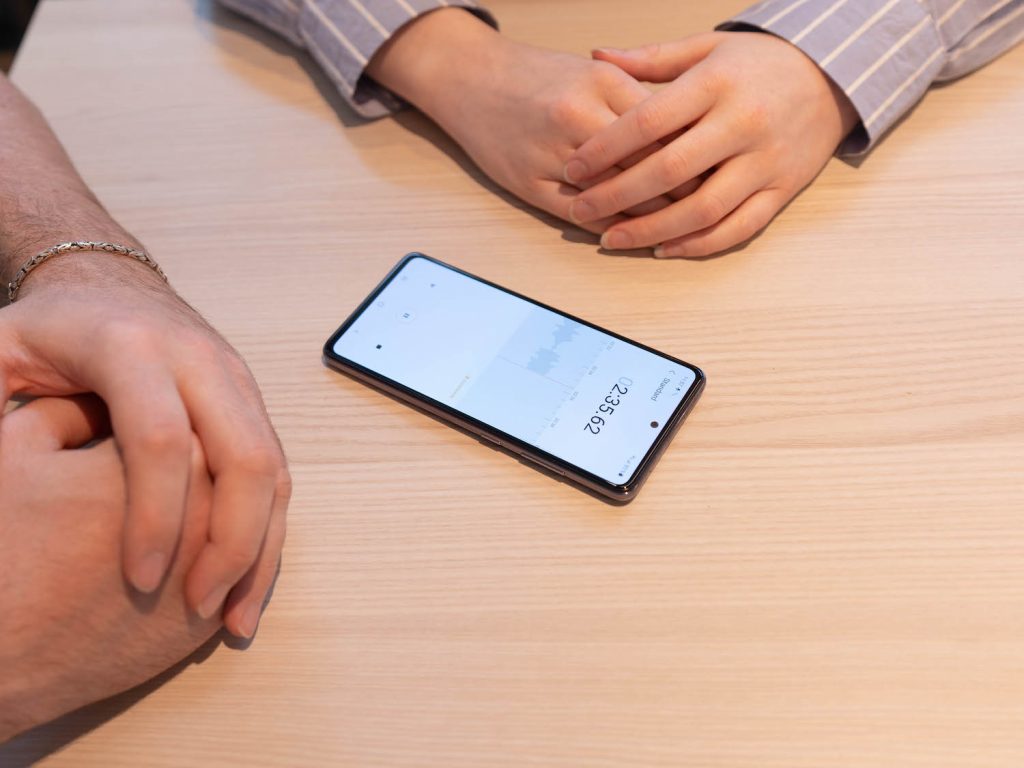
In the meeting use case, the recordings were mono, so the score for wideness was zero.

Volume
Samsung Galaxy A52 5G
55
99
The A52 earned an average score in volume. Audio files recorded by the device have decent loudness, but the volume is slightly too low with the life video app, but on target with the memo app.
The maximum recording level without distortion is quite limited; in the electronic music concert use case, our engineers noted spectral artifacts.
Here are our test results, measured in LUFS (Loudness Unit Full Scale). As a reference, we expect loudness levels to be above -24 LUFS for recorded content.
| Meeting | Life Video | Selfie Video | Memo | |
| Samsung Galaxy A52 5G | -26.1 LUFS | -22.3 LUFS | -20.8 LUFS | -21.5 LUFS |
| Samsung Galaxy S21 Ultra 5G (Exynos) | -26.8 LUFS | -20.1 LUFS | -22.5 LUFS | -22.3 LUFS |
| Apple iPhone 12 mini | -24.8 LUFS | -22.1 LUFS | -20.1 LUFS | -18.6 LUFS |

Artifacts
Samsung Galaxy A52 5G
63
97
Unlike its exceptional showing in the playback artifacts attribute, the Samsung Galaxy A52 5G struggled a bit here, earning an average score. Recorded signals can be hindered by artifacts such as pumping and clipping on peaks. In high SPL scenarios, strong compression was perceived, as well as distortion, especially on loud bass hits.

Background
Samsung Galaxy A52 5G
38
60
In the background attribute, the Galaxy A52 was middling. The background ambience isn’t unpleasant, but it doesn’t sound natural either. Because of a low-mid prominence, overall tonal balance is muffled and confused. The presence of temporal artifacts and resonances created an underwhelming background performance overall.
Conclusion
The Samsung Galaxy A52 5G punched above its weight class in terms of the quality of the sound it produces in playback, and did reasonably well as a recording device too.
With an exceptional artifacts score, good timbre performance, and strong spatial performance, the device provides good value in playback. As a recording device, it performed well in terms of overall timbre score, but has some shortcomings, including mono recording in the memo app and not capturing sufficient loudness in life videos.


DXOMARK encourages its readers to share comments on the articles. To read or post comments, Disqus cookies are required. Change your Cookies Preferences and read more about our Comment Policy.